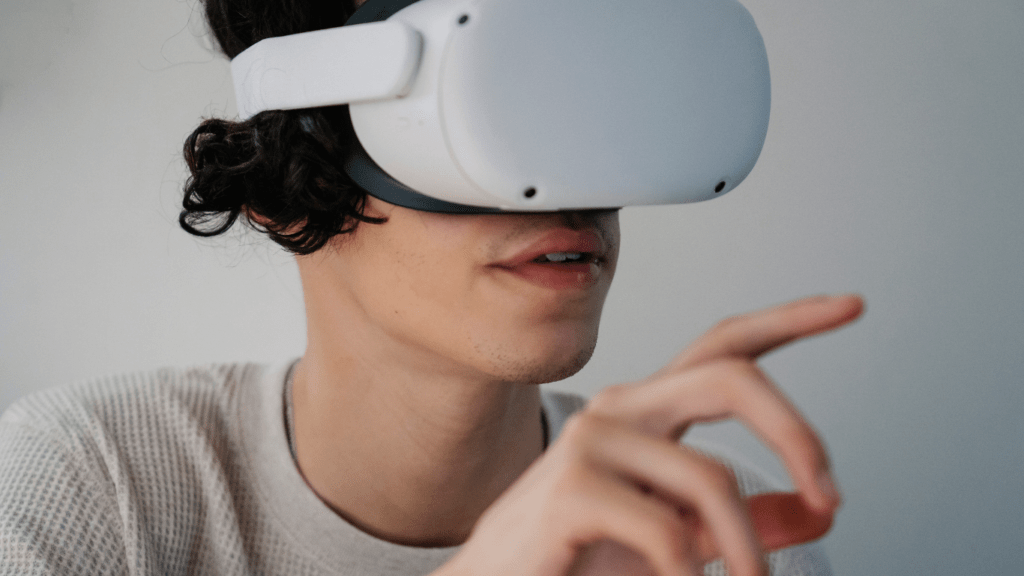Virtual Reality Casinos: An Overview
Virtual Reality (VR) casinos are transforming the gambling landscape, offering immersive experiences that go beyond traditional online platforms.
This section explores VR technology and its emergence in the casino industry.
What Is Virtual Reality?
VR creates a simulated environment, enabling users to experience and interact with 3D worlds.
Using VR headsets, users can explore virtual spaces, interact with objects, and communicate with other avatars. VR’s primary components include:
- headsets,
- motion controllers,
- haptic feedback devices.
Oculus Quest and HTC Vive are examples of popular VR headsets.
These tools ensure a fully immersive experience by tracking users’ head movements and actions, seamlessly integrating them into the virtual space.
The Emergence of Virtual Reality Casinos
VR casinos bring the glitz and glamor of real-world casinos into the comfort of one’s home. These platforms replicate physical casinos, complete with slot machines, poker tables, and even social lounges.
Early adopters like SlotsMillion and VR Casino offer comprehensive VR casino experiences. SlotsMillion, for example, features over 40 virtual slot machines, a bar, and panoramic views of a virtual city.
Gamblers can choose avatars, walk around, and even interact with other players.
This level of immersion aims to make users feel as though they’re in an actual casino, bridging the gap between online and land-based gambling.
The Technology Behind Virtual Reality Casinos
Virtual Reality casinos integrate advanced technologies to create immersive and interactive gambling experiences. They rely on both hardware and software innovations to replicate the ambiance of physical casinos.
Hardware Requirements
VR casinos need several key hardware components. VR headsets like Oculus Rift, HTC Vive, and PlayStation VR provide the visual immersion.
High-resolution displays and wide field-of-view lenses offer a realistic gaming environment.
Motion controllers, such as:
- Oculus Touch
- Valve Index controllers
track hand movements, letting players interact with virtual objects.
Haptic feedback devices like gloves and vests add tactile sensations, enhancing the sense of presence.
Fast internet connection supports the seamless streaming of data and interactions in these virtual worlds.
Software Innovation
The software powering VR casinos merges cutting-edge graphics with robust algorithms.
Game engines such as Unity and Unreal Engine create lifelike 3D environments. Artificial intelligence (AI) improves user interaction by adapting the casino environment based on player behavior.
Blockchain technology ensures the security and transparency of transactions within these platforms. Server infrastructure supports real-time multiplayer interactions, making the experience social and engaging.
Combining software tools and AI, developers manage to create dynamic, responsive casino environments that mirror real-world gambling spaces.
Benefits of Virtual Reality Casinos
Virtual reality casinos offer numerous advantages that enhance the overall gambling experience.
Enhanced Player Experience
Virtual reality casinos provide an immersive gaming environment.
Players interact with lifelike 3D graphics and realistic casino sounds, which elevate the sense of reality.
Advanced haptic feedback allows players to feel vibrations and textures, replicating the physical sensations of handling cards or spinning a roulette wheel.
In VR casinos, players can explore detailed virtual spaces, moving freely between gaming tables and slot machines, creating unprecedented engagement.
Opportunities for Social Interaction
Virtual reality casinos foster social interactions between players. Avatars enable users to communicate and collaborate, mimicking real-life social dynamics.
Voice chat features allow conversations, and multiplayer games offer opportunities for group participation.
Within these environments, social lounges and chat rooms facilitate connections, making the gaming experience more communal.
Players can gather around in:
- poker tables,
- join tournaments
- share experiences
enhancing the social aspect of gambling.
Challenges Facing Virtual Reality Casinos
Virtual reality casinos offer unique experiences but face several challenges that could impede their growth.
Technological Limitations
VR casinos rely heavily on advanced technology, presenting significant limitations. High-quality VR headsets and powerful computers are required to run VR casino environments smoothly.
These devices are often expensive, limiting accessibility for many users.
Latency issues can also affect gaming experiences when network speeds are insufficient, disrupting immersive gameplay.
Additionally, ensuring compatibility across various VR headsets and systems poses a logistical challenge for developers.
Regulatory and Security Issues
Virtual reality casinos must navigate complex regulatory landscapes.
Different jurisdictions impose varying regulations on online gambling, and VR casinos must comply with all relevant laws to operate legally.
This complexity increases costs and operational challenges.
Security issues, such as:
- preventing hacking
- fraud
also play a major role.
Ensuring robust cybersecurity measures to protect player data and financial transactions is crucial, yet challenging in a rapidly evolving technological environment.
Future Prospects of Virtual Reality Casinos

Virtual reality casinos could significantly reshape the gambling industry. They offer unique experiences and opportunities for both operators and players.
Potential Growth and Expansion
The market for VR casinos may see exponential growth.
According to Grand View Research, the global VR market size was valued at $15.81 billion in 2020, with a projected CAGR of 18% from 2021 to 2028.
Increased investment in VR technology and growing consumer interest can fuel this growth.
New entrants in the VR casino space may diversify game offerings to attract a broader audience.
Companies could introduce multiplayer experiences, virtual poker tournaments, and even VR sports betting.
These innovations could enhance player engagement and retention rates.
Geographical expansion is another prospect.
By overcoming regulatory barriers, VR casinos could tap into untapped markets in Asia and South America.
Localization of games and tailored marketing strategies could be crucial for success in these regions.
Impact on Traditional Gambling
VR casinos might challenge traditional brick-and-mortar casinos.
The immersive experience provided by VR can offer a compelling alternative to physical casinos.
Players can enjoy social interactions and realistic environments from their homes, reducing the need to travel.
Traditional casinos could adapt by integrating VR technology into their offerings. This hybrid model could attract a new generation of gamblers while retaining existing customers.
For example, VR poker rooms within physical casinos could blend the best of both worlds.
There’s also the possibility of collaboration between traditional and VR casinos.
Joint ventures could leverage the strengths of both formats offering unique;
- promotions,
- loyalty programs,
- seamless transitions between virtual
- physical gaming environments.

 Oliver Paget is a seasoned gambling advisor and prolific article writer, contributing his extensive knowledge and expertise to Gamble Guru Gate. With a background steeped in the gambling industry, Oliver has become a trusted voice for both novice and experienced gamblers seeking reliable information and strategic advice.
Oliver's journey into the gambling world began with a fascination for the statistical and psychological aspects of gaming. This curiosity led him to pursue advanced studies in statistics and psychology, equipping him with a deep understanding of game theory, risk management, and player behavior. His academic background, combined with hands-on experience in various gambling environments, allows Oliver to offer a well-rounded perspective on the industry.
Oliver Paget is a seasoned gambling advisor and prolific article writer, contributing his extensive knowledge and expertise to Gamble Guru Gate. With a background steeped in the gambling industry, Oliver has become a trusted voice for both novice and experienced gamblers seeking reliable information and strategic advice.
Oliver's journey into the gambling world began with a fascination for the statistical and psychological aspects of gaming. This curiosity led him to pursue advanced studies in statistics and psychology, equipping him with a deep understanding of game theory, risk management, and player behavior. His academic background, combined with hands-on experience in various gambling environments, allows Oliver to offer a well-rounded perspective on the industry.
